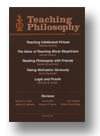|
articles |
|
1.
|
Teaching Philosophy:
Volume >
29 >
Issue: 3
Heather Battaly
Teaching Intellectual Virtues:
Applying Virtue Epistemology in the Classroom
abstract |
view |
rights & permissions
| cited by
How can we cultivate intellectual virtues in our students? I provide an overview of virtue epistemology, explaining two types of intellectual virtues: reliabilist virtues and responsibilist virtues. I suggest that both types are acquired via some combination of practice on the part of the student and explanation on the part of the instructor. I describe strategies for teaching these two types of virtues in the classroom, including an activity for teaching the skill of using the square of opposition, and several activities that encourage students to practice open-minded acts, intellectually courageous acts, and the motivation for truth.
|
|
|
|
|
2.
|
Teaching Philosophy:
Volume >
29 >
Issue: 3
Daniel Callcut
The Value of Teaching Moral Skepticism
abstract |
view |
rights & permissions
| cited by
This article argues that introductory ethics classes can unwittingly create or confirm skeptical views toward morality. Introductory courses frequently include critical discussion of skeptical positions such as moral relativism and psychological egoism as a way to head off this unintended outcome. But this method of forestalling skepticism can have a residual (and unintended) skeptical effect. The problem calls for deeper pedagogical-cum-philosophical engagement with the underlying sources of skepticism. The paper provides examples of how to do this and explains the additional benefits of teaching moral skepticism.
|
|
|
|
|
3.
|
Teaching Philosophy:
Volume >
29 >
Issue: 3
Daniel Silvermintz
Reading Philosophy with Friends:
Introducing Reading Groups into the Philosophy Classroom
abstract |
view |
rights & permissions
| cited by
Many students are overwhelmed when encountering a primary work of philosophy. Since their previous studies have not prepared them for the demands of reading a philosophic work, the philosophy instructor must be responsible for instilling in them the necessary skills to approach the subject matter. This article details the use and benefits of reading groups as a means of cultivating analytical reading skills. Students who participate in reading groups are reported to be more confident when engaging with primary texts and, consequently, more likely to participate in seminar discussions.
|
|
|
|
|
4.
|
Teaching Philosophy:
Volume >
29 >
Issue: 3
Kevin Zanelotti
Taking Motivation Seriously:
Proposals for Overcoming Student Resistance to Critical Thinking Courses
abstract |
view |
rights & permissions
| cited by
Traditional critical thinking courses introduce students to tools for analyzing and evaluating arguments and reasoning. There are, however, good reasons to think that those courses fail to motivate students to make full use of those tools. It is this motivational problem that is the focus of the present paper. In what follows, I present several proposals for overcoming student resistance to the discipline of critical thinking. I offer a three-step strategy for challenging students’ presumption of competency regarding critical thinking, thereby motivating them to embrace the tools we offer. I also sketch how this strategy can be applied in sections of a critical thinking course.
|
|
|
|
|
5.
|
Teaching Philosophy:
Volume >
29 >
Issue: 3
Michael B. Burke
Electronic Media Review:
Logic and Proofs (Web-based course)
abstract |
view |
rights & permissions
| cited by
Logic and Proofs, developed at Carnegie Mellon, is the only instructional program that can support a computer-taught course (not justa computer-assisted course) in modern symbolic logic. First I provide a description and an assessment of the program. Then, drawing on my twenty years of experience, initially with Patrick Suppes’ Valid (no longer available), recently with Logic and Proofs, I discuss the very substantial benefits, as well as the challenges to be addressed, when offering symbolic logic via a computer-taught course.
|
|
|
|
|
reviews |
|
6.
|
Teaching Philosophy:
Volume >
29 >
Issue: 3
Dominic A. Sisti
Practical Decision Making in Health Care Ethics
view |
rights & permissions
| cited by
|
|
|
|
|
7.
|
Teaching Philosophy:
Volume >
29 >
Issue: 3
James Bell
Philosophy of Literature:
Contemporary and Classical Readings
view |
rights & permissions
| cited by
|
|
|
|
|
8.
|
Teaching Philosophy:
Volume >
29 >
Issue: 3
Lisa Cassidy
Feminist Interventions in Ethics and Politics:
Feminist Ethics and Social Theory
view |
rights & permissions
| cited by
|
|
|
|
|
9.
|
Teaching Philosophy:
Volume >
29 >
Issue: 3
Edmund F. Byrne
The Philosophical Challenge of September 11
view |
rights & permissions
| cited by
|
|
|
|
|
10.
|
Teaching Philosophy:
Volume >
29 >
Issue: 3
Jeffrey M. Jackson
Freud
view |
rights & permissions
| cited by
|
|
|
|
|
11.
|
Teaching Philosophy:
Volume >
29 >
Issue: 3
Robert Drury King
Spectral Nationality:
Passages of Freedom from Kant to Postcolonial Literatures of Liberation
view |
rights & permissions
| cited by
|
|
|
|
